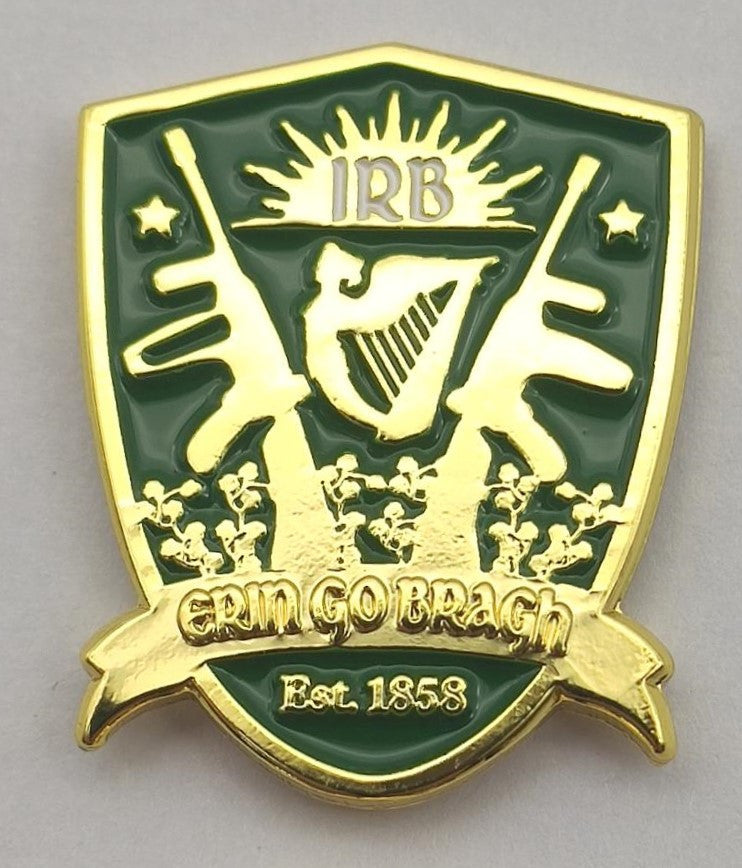IRB Badge
IRB Badge
Couldn't load pickup availability
On St Patrick’s Day 1858, in Peter Lanigan’s timber yard, Lombard Street, Dublin, James Stephens formally established the Irish Republican Brotherhood. It was originally named the Irish Revolutionary Brotherhood, but soon came to be known as the Irish Republican Brotherhood (IRB). The IRB was a small, secret, revolutionary body whose sole object was to ‘establish and maintain a free and independent Republican Government in Ireland’. Stephens was a Young Irelander, and was a lieutenant to William Smith O’Brien at the ‘Battle of Widow McCormack’s cabbage patch’ in Ballingary, Co. Tipperary, in August 1848. He was wounded three times and was smuggled onto a ship to England and then to France, where he spent the next eight years. Upon his return to Dublin in 1856, he determined to organise the revolutionary movement and that led to the founding of the IRB.It became known as the Fenian movement in the 1850s and 1860s, and was committed to the use of force to establish an independent Irish republic. After organising an abortive rising in March 1867, it suffered deep internal divisions over its leadership and strategy in both the United States and Ireland—whether it was best to strike at England, in Ireland or in Canada. The issue was resolved after a series of failed interventions in Canada in 1866, 1867 and 1871, and after bombings in England that did not lead Ireland closer to independence. The IRB was unable to exploit the weaknesses and divisions in the constitutional movement following Parnell’s divorce scandal, 1890–1. It was eventually rejuvenated in Ireland about 1907, led by Bulmer Hobson and Tom Clarke, thus preparing the way for all that followed.The governing body was the supreme council. Before 1916 this consisted of eleven members, and after the 1917 reorganisation it contained fifteen members. When not in session, all powers of the supreme council, except for declaring war, devolved onto an executive of three: the president, secretary and treasurer. The constitution provided for the establishment of a military council, subordinate to the supreme council. (The seven signatories of the 1916 Proclamation constituted the entire military council at that time.)Its constitution was dedicated to the use of force against England at any favourable opportunity, but this was to be a democratic decision: ‘The IRB shall await the decision of the Irish Nation as expressed by a majority of the Irish people as to the fit hour of inaugurating a war against England and shall, pending such an emergency, lend its support to every movement calculated to advance the cause of Irish independence, consistent with the preservation of its own integrity’, a clause adopted in 1873 in response to the controversies arising from the 1867 Rising.The IRB planned the 1916 Rising; the Irish Volunteers and the Irish Citizen Army made it possible. The establishment of the Irish Volunteers gave the IRB the great opportunity to train and equip its members as a military body for the purpose of securing independence for Ireland by force of arms and securing the cooperation of all Irish military bodies in the accomplishment of its objectives.Numerically the IRB probably never exceeded 2,000 members, but they were all extremely loyal and well trained, and there was very tight security. The executions of 1916 just about wiped out the supreme council, and after the prisoners were released the IRB had to reconstitute itself. In 1917 Seán McGarry was elected president, Michael Collins secretary and Diarmuid Lynch treasurer. According to the IRB constitution, the president, ‘in fact, as well as by right’, was regarded as the head of the government of the Irish Republic. HI
Joseph E.A. Connell is the author of Dublin in rebellion: a directory, 1913–1923 (Lilliput Press, 2006).
Further reading:O. McGee, The IRB: the Irish Republican Brotherhood from the Land League to Sinn Féin (Dublin, 2005).W. Mandle, ‘The IRB and the beginning of the Gaelic Athletic Association’, Irish Historical Studies XX (80) (1977).
Share




